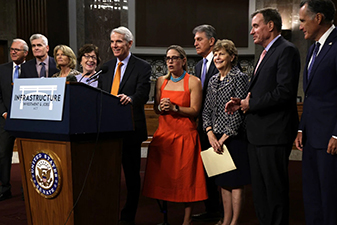|
By Cecile Entleitner, Associate, Blakey & Agnew
Every few years a group of individuals, chosen to represent their country, comes together in hopes of bringing home a victory. This feat often requires stamina, flexibility, perseverance, and teamwork. Of course, I'm not referring to the Olympics but to Members of Congress and their efforts to advance a multi-year infrastructure investment package. In August, a five-year infrastructure bill reached the highest podium of the Senate, passing by a bipartisan vote and setting the stage for the all-around final in the House.
Following some unforeseen delays, the opening ceremony was held on June 24. President Biden, alongside "flag-bearers" Senator Portman (R-OH) and Senator Sinema (D-AZ), announced they had reached an agreement on a bipartisan infrastructure bill. The first hurdle was cleared when the team of 22 bipartisan Senators released the legislative text on August 2, incorporating new funding and programs in addition to a full five-year surface transportation reauthorization. The text was introduced as a substitute amendment to the House-passed reauthorization proposal, the INVEST in America Act. The Senate measure, titled the Infrastructure Investment and Jobs Act (IIJA), provides approximately $1 trillion over five years – $550 billion of which is new spending above baseline levels – for infrastructure programs, including freight and passenger transportation, water provisions, electric grid and energy infrastructure, and broadband. Of this total, the U.S. Department of Transportation would receive nearly $568 billion over five years, which represents an increase of roughly $274 billion above current funding levels.
The IIJA includes funding for fan favorites as well as new programs stepping into the reauthorization arena for the first time. It provides a funding boost for the freight formula program, $8 billion over five years for the popular INFRA grant program for large freight projects, $7.5 billion for a range of smaller multimodal transportation projects under the RAISE (formerly TIGER/BUILD) grant program, $5 billion for passenger and freight rail improvements through CRISI grants, and $2.25 billion for the Port Infrastructure Development Program. New contenders include: a fully multimodal grant program focused on transportation megaprojects, funded at $5 billion; $40 billion for bridge replacement and rehabilitation; and $3 billion in highway-rail grade crossing and separation grant funds.
In addition to funding authorizations, the legislation also updates certain rules and protocols of the transportation infrastructure playbook through policy provisions. It raises the existing multimodal cap under the freight formula and INFRA programs, nearly tripling the amount of funding available to non-highway freight projects. The IIJA would also establish a new Office of Multimodal Freight Infrastructure and Policy within USDOT, acting as a referee in overseeing freight planning activities at the national and state level and managing the administration of multimodal grant programs, including INFRA, RAISE/TIGER/BUILD, and the new megaprojects program. Additionally, the bill seeks to bring new players into the interstate trucking workforce by creating an apprenticeship program for commercial drivers under the age of 21, who are currently limited to operating within state lines.
Once the legislative text was introduced, the trajectory to move the IIJA over the finish line quickly went from a sprint to a marathon. The bill was subject to several procedural votes and Senators filed hundreds of amendments seeking to incorporate their priorities into the upper chamber's final bill. The IIJA was subject to the "regular order" process, requiring the support of 60 Senators on most votes and often unanimous consent of all 100 Senators to consider amendments or motions to expedite consideration.
The highly anticipated release of the Congressional Budget Office (CBO) score of the bill on August 5 temporarily halted further action on the IIJA when
|

one Senator withheld his support for a unanimous consent agreement, intended to finalize the bill within hours, due to budget concerns. The CBO did not give the IIJA a perfect 10, concluding it would increase deficits by $256 billion over ten years. Senate negotiators, who had originally identified revenue sources to fully cover the bill's new spending, responded with a statement noting that "the new spending under the bill is offset through a combination of new revenue and savings, some of which is reflected in the formal CBO score and some of which is reflected in other savings and additional revenue identified in estimates, as CBO is limited in what it can include in its formal score." Due to these delays and the Senate's procedural rules requiring substantial support to offer amendments on the floor, few were actually taken up for a vote and 13 were ultimately incorporated into the legislation.
After some last-minute sparring between Senators hoping to receive the unanimous consent needed to consider additional amendments, which was unsuccessful, the Senate held its vote on final passage of the IIJA on August 10. The package passed with bipartisan support by a vote of 69-30, with 19 Republicans joining all 50 members of the Democratic Caucus to advance the bill.
The Senate has now passed the baton back to the House for further action on the IIJA and dove into consideration of a $3.5 trillion budget resolution focused on broader "human infrastructure" investment, which Democrats will seek to advance through the reconciliation process without the need for Republican support. The outlook for passage of the IIJA in the House remains unclear but may not be a smooth sailing. Speaker Pelosi (D-CA) has repeatedly stated that she does not intend to bring the IIJA up for a vote until the Senate advances the reconciliation package. Following the infrastructure bill's passage in the Senate, House members of the Congressional Progressive Caucus also indicated they would not vote in support of the IIJA until the Senate passes the $3.5 trillion package. A group of moderate House Members, however, sent a letter to Speaker Pelosi urging a standalone vote on the IIJA as soon as possible – noting that the reconciliation bill may not be completed before the current surface transportation authorization expires on September 30. Due to their slim majority in the chamber, House Democrats will need nearly unified support on both measures to ensure a home run.
There is also uncertainty regarding whether the House will accept the Senate's IIJA in its current form or seek additional amendments. House Transportation and Infrastructure Committee Chair DeFazio (D-OR) had called on Speaker Pelosi to allow further negotiations to add provisions included in the INVEST in America Act as passed by the House – particularly those pertaining to environmental improvements and public transit – through amendments or a House-Senate conference committee. While some T&I Committee Members and House progressives have continued to urge further changes to the IIJA, Chair DeFazio's most recent statement indicated he is "committed to continuing to fight for transformational funding and policies in the reconciliation process." Similarly, in an effort to avoid an IIJA ping-pong match between the two chambers, moderates have noted the White House and bipartisan Senate support for the legislation and called for its swift passage as currently written.
Blakey & Agnew, LLC is a public affairs and
communications consulting firm based in
Washington, DC.
|


